Fr. William H. Shannon 1917-2012
Msgr. William H. Shannon, founding president of the International Thomas Merton Society, died on April 29, 2012.
The Merton Journal is pleased to publish in this Advent issue a Christmas homily given by Bill Shannon in 2009. ADVENT 2012: VOLUME 19 NUMBER 2
Christmas
is No Ordinary Time
by
Bill Shannon
I am sure you have all had the experience of having an eye examination and having drops put in your eyes that dilate the pupils. When the pupils of the eyes are dilated, wonderful things happen. Your eyes become wide-angle lenses. Your vision is widened and expanded. You see things you could never see before. Headlights on oncoming cars are no longer just white lights: they are all aglow with sparkles spilling out in all directions. And the traffic lights aren't just signals; they are Christmas trees with lights going on and off, flashing first red colours all around and then green. Yes, with your eyes widened and your vision expanded, you see so much that you never see in your more prosaic moments.
That experience, so it seemed to me, may be taken as a kind of paradigm of the Christmas experience. Christmas is a feast that expands our vision. We see the night sky all lit up. The Christmas event-the birth of Mary's Child-has to be placed at night, of course. It just wouldn't work during day time. We must have the night-with brilliant sparkling stars and glorious colours, with angels dancing and singing, and the glory of God shining all about for a people who for so long a time have been sitting in darkness.
Now it's true we don't usually see angels-on ordinary days, that is. But Christmas is no ordinary time. It's a time when we see lights and angels. The angels sing to us, but ... at least so I think ... first they dance and sing lullabies to an infant that is 'one hour's age, yet old as God' (borrowed from a poem by my friend, Sr. Miriam Pollard, OCSO).
They dance and sing for us too. And their song is about God who, in the words of the poet, 'has poured himself so flawlessly into a human heart' (Sr. Miriam again). Lest we see only an infant in a manger bed, the angels expand our vision and we see One who is David's son and Mary's son, yet God's Son as well. And above all, He's a Saviour. That's what they call him: a Saviour who is Lord and Messiah. The angels dilate the eyes of our hearts, and we see what the eyes in the head can never see.
Twenty years ago, while in Jerusalem, I heard a remarkable Christmas story. As far as I know it is a true story. It's about a couple who years ago lived in a home that was built above the Damascus Gate of the Old City. They were a well-to-do couple. They were Christian. And it was Christmas Eve. They locked the door of their home and set out for the short bus trip to Bethlehem. They would get there in time for the midnight Mass. It would be celebrated by the Latin Patriarch in Bethlehem. As they took the road to Bethlehem, they came upon a young couple-younger than they-walking slowly and hesitantly toward the gate. They were obviously poor and the woman was obviously pregnant.
The older couple who were on their way to Bethlehem were moved with compassion for them. 'Can we direct you to wherever you are going?' they asked. The young man said: 'We are poor and we don't really know where we are going.' And the young man and his wife moved on. The older couple hesitated. But, if they didn't hurry, they would be late for the Mass.
 |
The remarable story - recalls my
footsteps at the place in Christmas 2004
|
They started walking toward the bus that would take them to Bethlehem. All at once they stopped. As if in unison, they said to one another: 'What are we doing? We are not going toward Bethlehem. We are going away from Bethlehem. Bethlehem came to us and we didn't even recognize it.' The eye of their hearts had been dilated. Their vision was expanded. They turned about, caught up with the young couple and offered them the hospitality of their home. And there in the house at the Damascus Gate, the young woman gave birth to her first-born son. And maybe, just maybe, the older couple saw angels dancing and singing and stars shining brightly ... over the Damascus Gate.
That house over the Damascus Gate still exists. When the older couple decided years later to go elsewhere, they donated their house to the city and it became a hospital. But they would never forget that one night it had been Bethlehem for them.
Christmas is a feast that we can appreciate only if we allow the eyes of our hearts to be dilated. We have to give up our everyday vision: a vision that can see only the little things right before us. We have to hear Paul telling us: 'The grace of God has appeared, bringing salvation to all.' We have to look beyond surface facts and see mystery: the mystery of a tiny Child just born who is yet older than the universe.
We have to expand our vision. Like the older couple in Jerusalem, we have to open the eyes of our hearts to see that mystery of Bethlehem is never far away. We will find Bethlehem in the poor, in the lonely, in those for whom our world has no more room than it had for Mary's Child.
Today we should look for Bethlehem in the refugee camps in Iraq, Afghanistan, and so many other places where mothers may be giving birth to children this very day in conditions of terrible misery, poverty and piercing cold, where mothers who have already given birth try desperately to keep their infant children warm and fed-and alive.
Nearer at home, we could very well see Christmas as a time to remember single parents. I recall one past Christmas when a mother, filled with sadness and feelings of helplessness, told me about her daughter who just a few days earlier had given birth to a baby without the support of a partner. The woman's husband was terribly upset: he refused to allow their daughter to come home for Christmas. This was a mixed up situation, to be sure, where many emotions were struggling to surface. I think there are many such young women for whom there is no room, as there was no room for God's Son when he came into our midst. Mary would have empathized with such young women. For Mary surely knew what people had been saying about her. ...behind her back, of course. But these were people who had never allowed the eyes of their hearts to be dilated.
Thomas Merton has written:
[Christ's] place is with those others for whom there is no room. His place is with those who do not belong, who are rejected by power, because they are regarded as weak, those who are discredited, who are denied the status of persons, tortured, exterminated. With those for whom there is no room, Christ is present in this world. He is mysteriously present in those for whom there seems to be nothing but the world at its worst .. .It is in these that he hides himself, [the people] for whom there is no room.
(Raids on the Unspeakable, pp.72-73)
But we can grasp this deepest meaning of today's holy feast, only when we have allowed the eyes of our hearts to be dilated, only when we have let our vision be expanded. For only then can we hear the rustling of angel wings and the songs that angels sing. For isn't it obvious that such songs can be heard only by those whose hearts are opened wide? For otherwise there is no room in which angels can sing.
++++++++++++++++++++++++++++++
Fr. William H. Shannon 1917-2012
Msgr. William H. Shannon, founding president of the International Thomas Merton Society, died on April 29, 2012. Fr. Shannon, professor emeritus in the religious studies department at Nazareth College, and a priest of the Diocese of Rochester, New York, was the author of numerous books, including the much acclaimed biography of Merton, Silent Lamp, and Thomas Merton 's Paradise Journey: Writings on Contemplation. He was the general editor of the Thomas Merton letters, and co-author of The Thomas Merton Encyclopedia with Christine Bochen and Patrick F. O'Connell, as well as a number of books on spirituality, and has been published in many journals. Fr. Shannon was honoured at the 2009 ITMS
conference in Rochester.
The Merton Journal is pleased to publish in this Advent issue a Christmas homily given by Bill Shannon in 2009.
ADVENT 2012: VOLUME 19 NUMBER 2

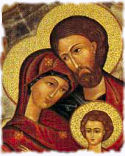 Today is the feast day of the Holy Family, but also every family's feast day, since the Holy Family is the patron and model of all Christian families. Today should be a huge family feast, since it is devoted entirely to the Holy Family as a model for the Christian family life. As Rev. Edward Sutfin states:
Today is the feast day of the Holy Family, but also every family's feast day, since the Holy Family is the patron and model of all Christian families. Today should be a huge family feast, since it is devoted entirely to the Holy Family as a model for the Christian family life. As Rev. Edward Sutfin states: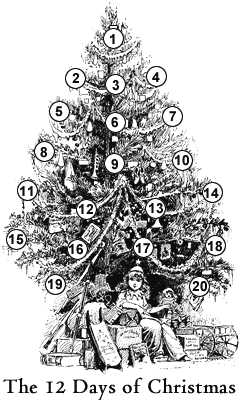

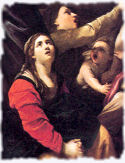 The Holy Innocents saved the Child Jesus from death by King Herod by the shedding of their own blood. The Holy Innocents are the special patrons of small children, who can please the Christ Child by being obedient and helpful to parents, and by sharing their toys and loving their siblings and playmates.
The Holy Innocents saved the Child Jesus from death by King Herod by the shedding of their own blood. The Holy Innocents are the special patrons of small children, who can please the Christ Child by being obedient and helpful to parents, and by sharing their toys and loving their siblings and playmates.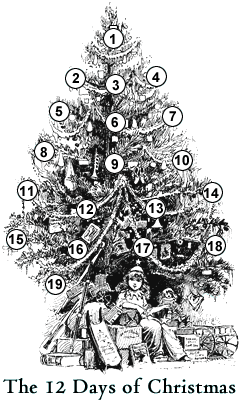




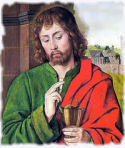 St. John was born in Bethsaida, and like his brother James, was a fisherman. He was called while mending his nets to follow Jesus. He became the beloved disciple of Jesus. He wrote the fourth Gospel, three Epistles and the Apocalypse. His passages on the pre-existence of the Word, who by His Incarnation became the light of the world and life of our souls, are among the finest of the New Testament.
St. John was born in Bethsaida, and like his brother James, was a fisherman. He was called while mending his nets to follow Jesus. He became the beloved disciple of Jesus. He wrote the fourth Gospel, three Epistles and the Apocalypse. His passages on the pre-existence of the Word, who by His Incarnation became the light of the world and life of our souls, are among the finest of the New Testament.



